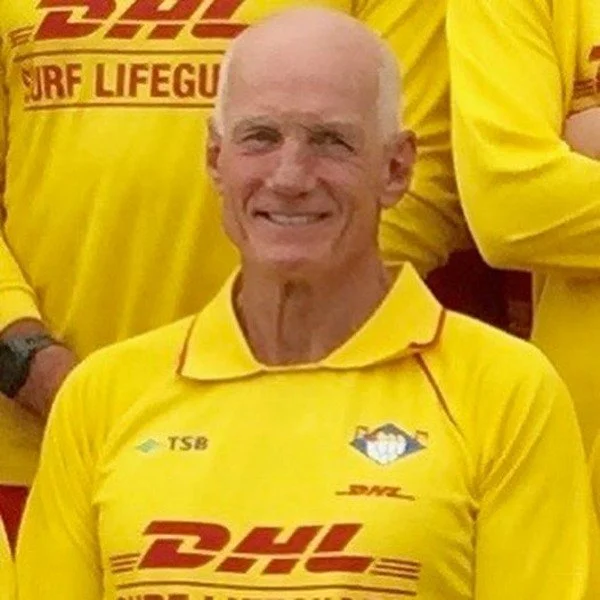World Record Swim
By Andy Simpson (Donegal House 1958-1966)
“Relieved! Thank God that’s over!”
The first words I uttered as the interviewer thrust the microphone in my face and asked how I felt.
Perhaps a strange statement to make but I was struggling trying to breath because of chest pain and at the same time thinking that this journey is finally over.
Don’t be mistaken, I was thrilled I had accomplished my goal but more so that my family had seen me do it and that the involvement they had had to endure for the previous 18 months was also over for them.
In a nutshell, one breath, 43 strokes, 18months of focused training, 35 years of buildup, one world record!
Yes, I had broken many New Zealand records previous to this swim, and hovered in the world top 10 ranked swimmers for about 15 years, but this had been a life’s ambition to determine how good I could have been.
I love the expression, “We should always strive to be the best we could have been.”
Interestingly the time swum was almost four seconds faster than the school record-breaking swim in my last year at Dilworth 58 years earlier.
To break a world sprint record felt pretty good, and answered a question I had thought about for 56 years. And that is why I was glad it was over!
My childhood was similar to many at Dilworth and 9 years of old school buildings, canings, no leave Sundays, basic food, and some really old school discipline framed by a governance honed in the army, left its mark. Enough money was an issue with not only those at Dilworth but all families and particularly those who had parents who suffered during the war. That experience made me realise that if I wanted anything it would be up to me to get it, and the life at Dilworth gave plenty of lessons. To accept the situation was the easiest way to endure it.
Swimming for me was an escape and a form of relaxation. I always felt very comfortable and had a great feel for the water, and to be in that environment either swimming, diving or surfing was my best time. In those days surfboards came without leg ropes so being fit came with the territory. The new pool at school provided us with a chance to play “tiggy” and between the two that was the only training I ever did.
Following school, I spent five years in a government cadetship eventually accomplishing qualification as a Registered Quantity Surveyor. With no family support it was the only way of gaining a qualification but it did entail part time work along with 15 hours of lectures each week and the associated homework. The first year was in Wellington, the second in Hamilton and thereafter I was based in Auckland.
It was in Hamilton that I worked with someone who swam for the local club (Rovers) and represented Waikato and who was often talking about the prizes won at the fortnightly club competition. Towels, chocolates, umbrellas etc., inspired me to turn up and try my luck. It was Summer of 1969 and with minimal training I was soon doing okay. Training on the few days I could was restricted to 15-20 minutes in my one hour lunch break during which I would get to the pool, change, swim, change, eat lunch and get back to the office. This to me was dedication. I had no idea what others were doing but I couldn’t take time off from lectures to train with them in the evenings. It was enough to get me into the Waikato Rep team and enjoy a few inter provincial competitions.
At the end of 1968 I was approached by the club coach to consider joining his squad and let him train me. The carrot was to make the NZ Games team. When I asked what it meant and what I had to do he replied.
“Stay in Waikato, train hard for 18 months and pay him $30.00 a year”.
I had already received notice of my posting to Auckland and I did not have $30.00 to pay him so I politely declined. Another deciding factor was that most other swimmers in those days were teenagers who gave up the sport at the age I was then, 19-20.
With no family support or advice, and it not fitting in with any plans I had I made my way to Auckland. Rugby, squash, tennis, and of course diving and surfing were available to me in Auckland and I enjoyed them all.
It wasn’t until some 22 years later when enrolling my children in swim lessons that I was asked if I was interested in Masters Swimming at the local Pakuranga Club. I had a very busy life at that stage managing two farms, a construction company and a property development company, so I needed a sporting out let to maintain my health and have a distraction from work pressure.
That was around 1989 and soon I was competing for the club and within a few years breaking New Zealand records. The drive was, “How good could I have been and how far could I have gone?”
It is intriguing to test the mind to what most think is its maximum but I say to you, that no one knows that because each time you think you do, it opens another barrier to break through. Most of us are restricted by aiming to better someone else’s best, rather than becoming the best you can be.
The body will do whatever is asked of it. Yes, it will complain, and yes it will be painful and sometimes break, it will be time-consuming, life restricting, fraught with injuries, and complications, not forgetting the effect on those around you.
To finally answer my question of “how good?” I set a target of 18 months and aimed for the NZ Masters Champs in June 2024.
Nine months of technique and basic fitness, three months of added strength, then adding six months of speed work, breath training and chest expansion, dietary refinements, gym work, stretching, and the last four months advice from a recognised New Zealand Sprint Champion on how to train.
Up until this time I had never been coached or trained by anyone. Most of my training had been on my own as times better suited me – I hate swimming early mornings!
I had made a goal, set a pathway to achieving it and set out to be successful. To make it real I believe you have to tell someone your goal, you have to focus on it full time, be prepared to change direction on the way and to deal with hiccups, organise your life in such a way that it is the main focus, and to get assistance from those close to you. Barriers will occur, but if you’re prepared for those and willing to alter course you will stay on that pathway to achieving your aim.
In the two months before the race, I managed to badly pull my chest muscles after my breathing coach told me what the All Black props could manage. A new challenge? The last six weeks were hard work in training and doing my breath holding exercises.
However, I was each day holding my breath for 3.50 mins or longer, and swimming under the record at training on one breath at the dive. I was confident knowing I had done all I could and as long as I made the blocks on the day I would do the business.
With world records mostly held by ex-Olympians, I now know how good I could have been.
I’m a keen supporter of anyone who cannot see a way through or does not have the required support to get to a goal. But first you must set that goal and be prepared to dedicate time and effort towards gaining it. It is amazing what can be achieved if the pathway to success is clearly defined and understood.
Remember that “If something is impossible, its only because no one has done it yet”.


